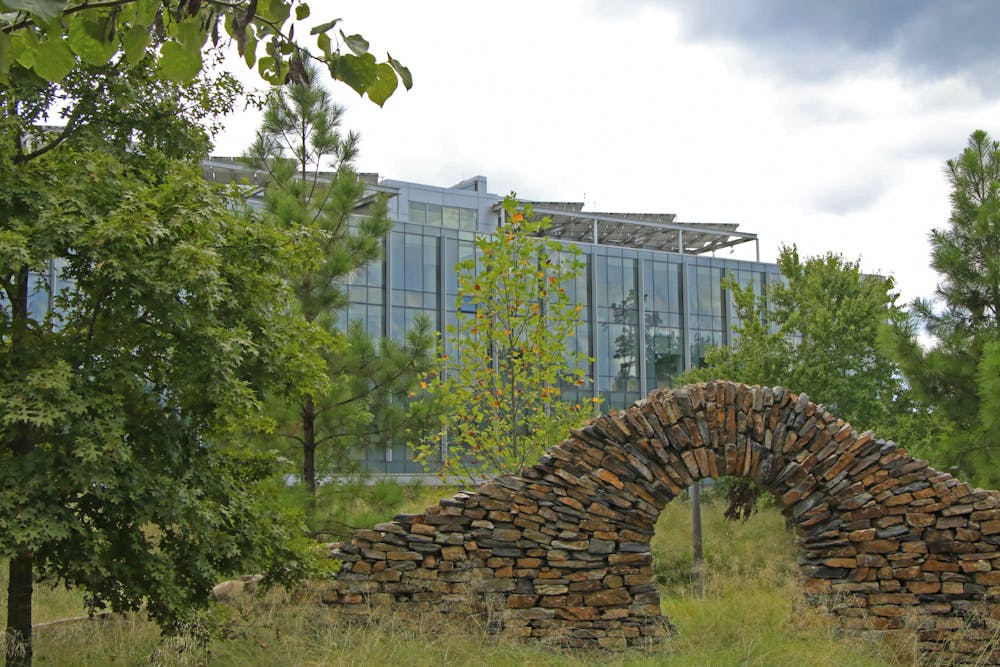In September, Duke announced its Climate Commitment, an initiative pledging to unite the University’s education, research, campus operations and public engagement missions in support of environmental justice and sustainability.
The drive of the commitment has trickled down into the classroom, where students and professors have long been examining the science, history and politics behind climate change while developing innovative solutions.
Looking for a last-minute drop-add class? Here are six climate-centered courses offered this spring and how the Climate Commitment may have altered their learning objectives.
Ethical Dimensions of Environmental Policy (ETHICS 288S, GLHLTH 248S, PUBPOL 262S)
Instructor: Brianna K Jowers
Time: Tu 10:15 am - 12:45 pm
In this course, students engage in a semester-long research project exploring the ethical dimensions of a certain environmental policy. Jowers suspected that many students will want to explore the decision not to divest from fossil fuels, but said she gives students largely free rein over the trajectory of their research projects.
“I leave it a little bit open to discussion about what they think is going to be the most ethically rich policy decision to explore,” Jowers said.
This course first launched in 2017, but was on pause during the pandemic due to its hands-on nature with focus groups and conversations with the people affected by the policies.
Engineering Sustainable Design and the Global Community: Environmental Focus (CEE 315-60)
Instructor: David Schaad
Time: WeFr 12:00 pm - 1:15 pm
This course allows students to design projects that “meet a community-identified need,” said Schaad, faculty advisor for Duke Engineers for International Development. Students work with local, national or international community partners to engineer sustainable and cost-effective solutions, many of which address environmental issues. This summer, for example, students will aid in designing a secondary school for a project in Uganda.
The course has existed for several years, but Schaad hopes the climate commitment will shed new light on its importance.
“One of the things that we emphasize in this class is resources, energy, waste and all the things that are talked about in the new Climate Commitment, so it just refocuses what we're doing,” he said.
Climate Change for Future Leaders (ECS 103, EOS 103)
Instructor: Drew Shindell
Time: MW 10:15 am - 11:30 am
A gateway course for the major in Earth and Climate Sciences, this course offers a broad survey of climate science and the human impact on the climate system, examining possible solutions to the effects of climate change on biodiversity and human health.
Shindell described this 100-student course as a more accessible, restructured version of a previously taught 300-level course with the capacity of 36 students, making it “perfectly aligned” with the Climate Commitment’s mission of bringing climate change science to more students.
Environmental Issues & the Documentary Arts (CINE 315S, DOCST 315S, ENVIRON 315S)
Instructor: Miguel Rojas Sotelo
Time: TuTh 1:45 pm - 3:00 pm
This course highlights the ways in which writers, artists, filmmakers and photographers from around the globe have documented environmental issues and influenced public discourse surrounding them. Students also have the chance to depict these issues using a chosen form of media.
Sotelo believes his course aligns with the principles of the commitment, and he is looking forward to a more sustainable future at Duke.
North American Environmental History (HISTORY 345, PUBPOL 278, ICS 340)
Instructor: Dean Bruno
Time: TuTh 1:45 pm - 3:00 pm
“We often talk about how humans change the environment,” Bruno said. “But there's the other side of that question. And that is, how does the environment change us in ways that we often don't realize?”
This course examines that question, placing special emphasis on the historical origins of current environmental politics in North America. Bruno commended Duke for finally embracing a climate policy built on interdisciplinary input.
“Environmental historians, many of us would say, humbly and modestly, ‘Welcome to the party,”” he said.
The Theory and Practice of Sustainability (ENVIRON 245, SUSTAIN 245)
Instructors: Charlotte Clark and Tavey Capps
Time: TuTh 10:15 am - 11:30 am
In this course, students learn about the theory of sustainability and put their knowledge into practice through on-campus projects.
“It definitely looks at the theoretical and definitional side of sustainability,” Clark said. “In addition to that theoretical side, the heart of the course are these campus based client projects.”
In past projects, students have partnered with the Duke Gardens to develop its K-12 curriculum. While the partnership remains intact, the students’ work will look a little bit different this year.
“Now the Gardens one is about how you garden for climate resiliency,” said Clark, adding that the goal is for students to develop resources for the Gardens to share with the public, such as classes, tours and print materials.
“Another change that we made is we invited the city manager of sustainability, Amy Armbruster, and the county director of sustainability, Tobin Fried, to do a project with us around extreme heat in Durham,” said Clark. Students will analyze existing data and research and make recommendations to improve public health.
Get The Chronicle straight to your inbox
Signup for our weekly newsletter. Cancel at any time.
Mia Penner is a Trinity sophomore and an editor-at-large of The Chronicle's 119th volume.

